Communicating Christ in a Multicultural World
14. Buddhism
Lesson Objectives
To understand what Buddhists believe, and how to reach them with the Gospel of Jesus Christ.
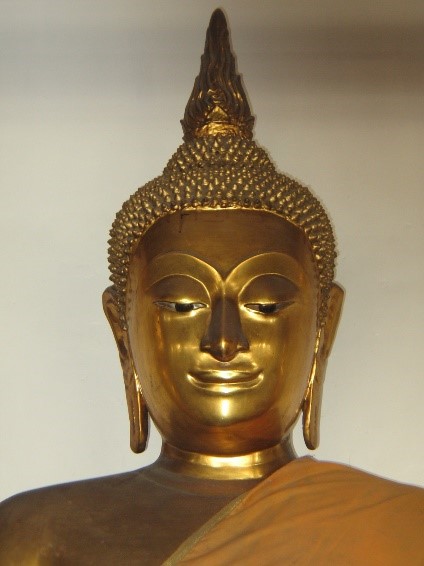
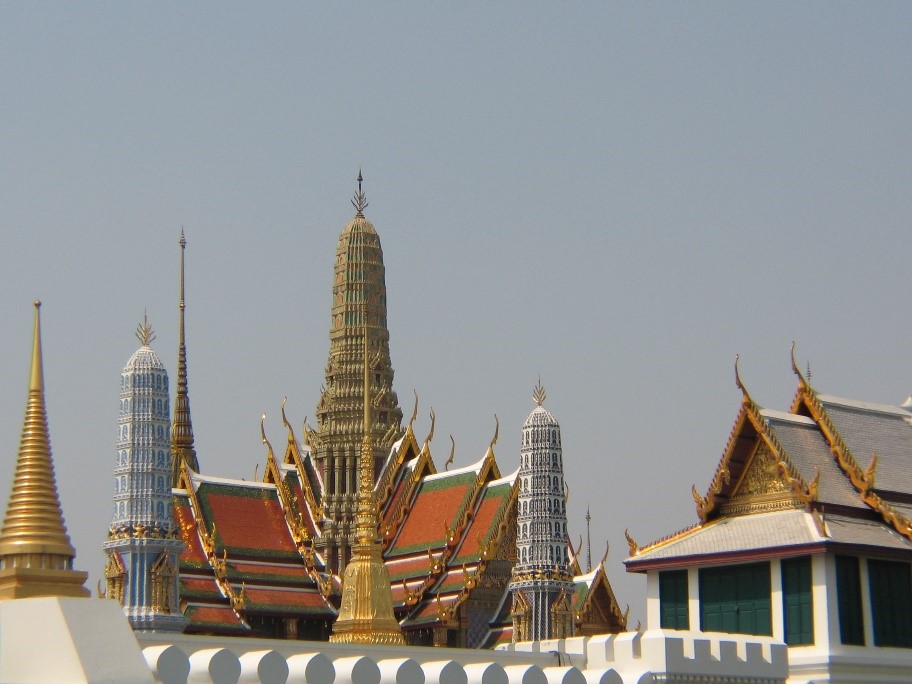
Introduction
Buddhism came out of the same Indian soil as Hinduism.
The title (not name) "Buddha" means "Enlightened One". The basic assumptions in Buddhism are that: there is no God: each person may become a Buddha, an "Enlightened One" and escape the endless cycle of suffering to achieve Nirvana.
Origins
Founded by a rich young prince named Gautyama (568-483BC), from Lumbini (near Banaras), India; a follower of the Hindu Sankhya philosophy.
Growing up a rich young prince Gautyama came to believe his condition and all of life's pleasures were vain and worthless, ie of no value in achieving spiritual freedom. At the age of 29 he renounced his life of privilege to seek a new life as a "Holy Man", an ascetic, Gautyama was convinced this was his incarnation. He ultimately gained disciples and embarked on a missionary life teaching people about the futility of human existence and Nirvana (lit. "blowing out", like extinguishing a candle).
At first he followed two Brahmin teachers. He eventually became dissatisfied with the teaching of the Brahmins (because they could not teach him how to escape the cycle of reincarnation), so he abandoned Hinduism. He replaced the Hindu Brahman with Nirvana, a state where all desire with its attendant suffering is extinguished.
Gautyama subsequently experimented with but abandoned strict asceticism, as he believed that this weakened both body and mind rather than focusing the person on their spiritual search. Meditating under a bohdhi-tree (a fig tree) in Uruvela one day he entered the stage of "enlightenment" and became a Buddha. He propounded a "Middle Way", a path between the extremes of self-indulgence and self-mortification.
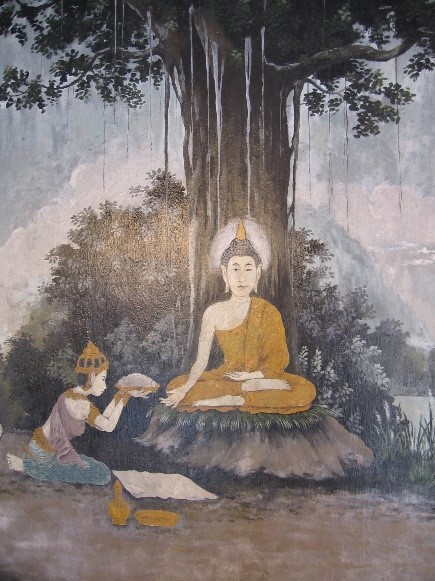
(There is a widespread belief among Hindus that Buddha was the incarnation or avatar of the Hindu god Vishnu. However, while he retained belief in reincarnation, Buddha made a decisive break from Hinduism. He rejected the Hindu holy writings; denied it is possible achieve oneness with the life source, Brahma; abandoned the caste system. yoga and priesthood; and denied the existence of God in the sense of a higher being.)
In time, tensions developed between conservative, legalistic followers of Buddha who emphasised austerity and literal obedience to his teachings (Theravada Buddhism; sometimes disparagingly referred to as Hinayana, or "Little Vehicle") and the majority, who interpreted his teachings more liberally and more supernaturally (Mahayana, or "Great Vehicle "). Other schisms followed over the centuries.
The Mahayana branch of Buddhism is found mainly in China, Korea and Japan. The Theravada branch is strongest in Sri Lanka, Burma, and other parts of South-East Asia. The former is known as Northern Buddhism; the latter as Southern Buddhism.
There have been few Buddhists in India since the Muslim invasion (and resultant destruction of Buddhist monasteries) in the 11th Century. In most parts of India where Buddhism remained it lost its distinctiveness and reverted to Hinduism.
Buddhism has been a missionary religion from time to time (beginning with King Asoka, in the 3rd century BC, who carried Buddhism throughout India, Ceylon, Burma, Siam and Tibet)'. It has developed distinctive forms in different countries.
During the 1900s, Buddhism spread to Europe, the United States of America, and Australia.
The number of Buddhists in the world today is estimated at over 300 million.
Religion or Philosophy?
Buddha is supposed to have said,
"l am all-wise; I am free from stains; I have no teacher; no one is my equal; in the world of men and gods no being is like me. I am the holy one of the world'.
Depending on how the Buddha's teachings are to be interpreted it is possible to be a Buddhist-
- atheist
- theist
- dualist
- monist
- believer in salvation to a blissful paradise
- believer in salvation through transition to nothingness.
There are some who claim Buddhism is merely a moral philosophy, a non-theistic disciplinary system, but not a way of life. This is because Buddha apparently did not teach about:
creator; prayer; worship, redemption; forgiveness; heaven; judgement; hell, rewards, angels.
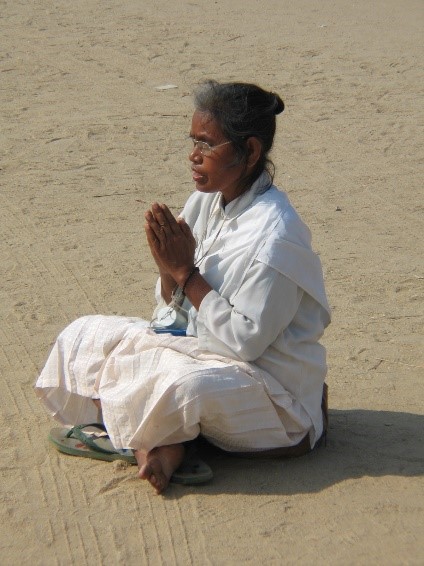
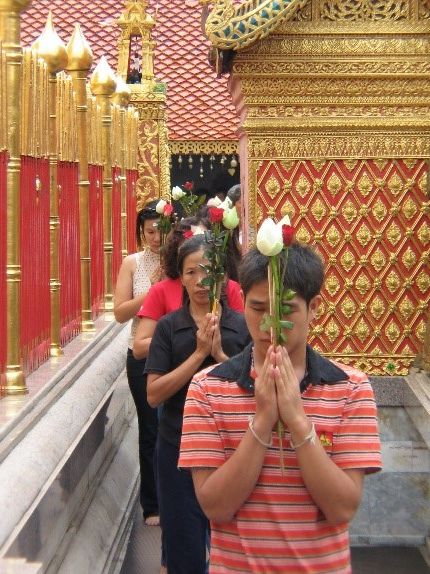
Based on our earlier definitions of religions however, there can be no doubt that Buddhism is a religious system. Many (non-Christian) anthropologists also view Buddhism as a religious system little different from popular Hinduism.
In some cultures, Buddhism has been syncretic, eg combining with worship of Bon in Tibet, where rosaries, prayer wheels, oracles, ghost traps and other superstitious practices accompany Buddhist practices. (Tibetans regard the Dalai Lama as a reincarnation of the bodhisattva Kuan Yin).
In most Buddhist countries, monks are expected to live a life of poverty, meditation, and study. Some become monks for life. Others serve in the sangha for short periods of time. Monks wear special orange or red robes, and are a common sight
Buddhist monks take the following oath
"I take refuge in the Buddha.
I take refuge in the Doctrine.
I take refuge in the Order"
Members of the monastic sangha undertake strict rules of training and promise to refrain from
- harming any living thing;
- taking what is not given;
- misuse of the senses, such as unchastity;
- wrong speech,
- taking drugs or drink which cloud the mind,
- taking food at unseasonable times, such as after midday;
- dancing, music, singing, and unseemly shows;
- the use of garlands, perfumes and things that beautify and adorn the person,
- using high and luxurious seats and beds; and
- accepting gold or silver.
Members add to these ten rules another 227 rules of life, intended to make their community life work as it should
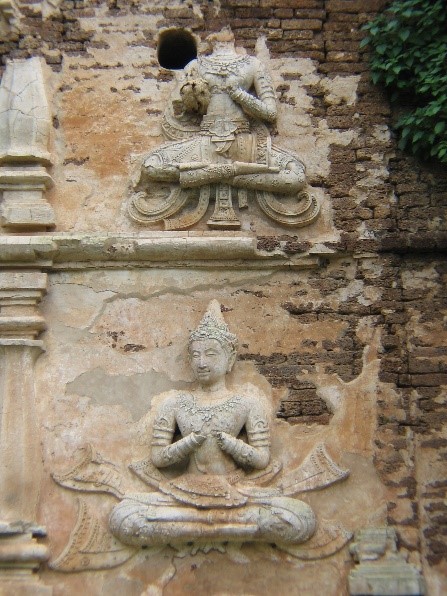
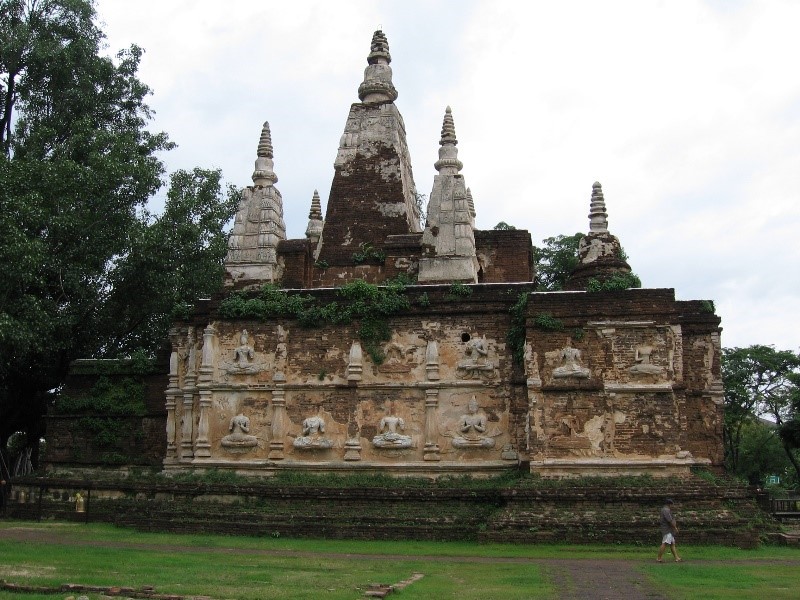
Large, ornate temples have been built around Asia, to house the many and varied objects of worship, mainly images of Buddha (in various forms). Shrines in peoples' homes are common
People also become or are counted as Buddhists if they "take refuge" in the Buddha, the Dharma (Dharma means teaching, especially the teaching of the Buddha and his followers), and the Sangha (the community). These three refuges are called the three jewels or precious things of Buddhism. In the Sanskrit language the word for the three jewels is triratna. Buddhists believe that taking refuge in the Buddha means more than just following him. It also means that a person has confidence in the nature of enlightenment, whether it is manifest in one's own life or in other beings.
Scriptures
The sacred languages of Buddhism are Pali and Sanskrit. Pali is the language of the Thevadran canon, while Sanskrit is the language of the Mahayana scriptures.
In the absence of contemporary records or Buddha and Buddhistic teachings (the earliest records date from at least four hundred years after his death), much value was formerly attached to palm leaf manuscripts in Pali. Recently, a good deal of weight has been given to the Buddhist traditions in Sanskrit, Tibetan and Chinese.
- The Pali Scriptures of Theravada Buddhism consists of three groups of writings known as "The Three Baskets"; help to contains the words of Buddha. Contains regulations for monastic orders, sermons, doctrines, etc. About eleven times the size of the Bible.
- There is no Mahayana canon, only a collection of separate texts written in Sanskrit. Most originals no longer exist, but are preserved in Chinese and Tibetan
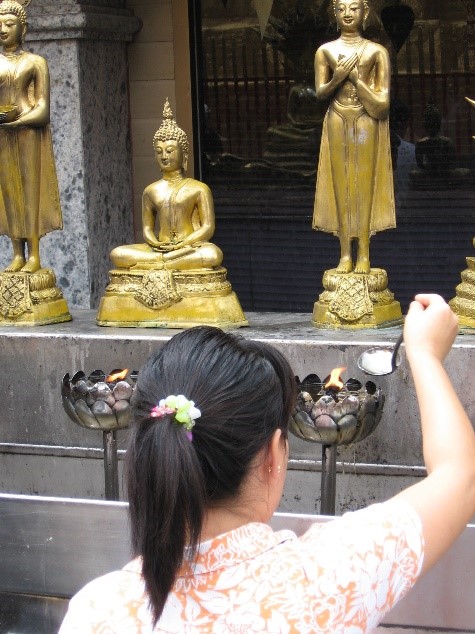

Beliefs of Buddhism
This world exists as a result of multiple causes and conditions. What the world is today is the result of what has happened previously. There is no escape from, this law of cause and effect (karma), short of Nirvana. What survives death is not us but our karma, which determines the next existence. The law of karma operates in both moral and physical dimensions of human life. Man is in bondage to the cycle of the results of good and evil actions.
Nirvana is attainable by anyone of any caste of class who exerts the necessary effort
Much of Buddhism is depressing.
"Misery only doth exist; none miserable. No doer is there; naught but the deed is found. Nirvana is, but not the man who seeks it, I he path exists, but not the traveller on it."
(Visuddhimagga XVI)
According to Buddhist teaching, human beings have no souls. A person's existence is not interpreted in terms of sin but in terms of suffering. Ignorance of the true nature of our present state is pandemic and must be dispelled by the preaching of the Buddha' s message.
God
Strict Buddhists deny the existence of God. The Buddha did not deny His existence but taught the theism ""ends not to edification". He emphasised that we should all seek our own spiritual enlightenment.
Mahayana Buddhism has given birth to numerous Buddhas and bodhisattvas (Saviour beings, or saints who have deferred their entry to Nirvana until they save people from this present world of misery) and Gautyama Buddha has himself been deified .
Buddha did not claim to be deity, but only an example of one who had discovered enlightenment on the true path. He said his teachings were like a "raft" that should be left for others once one reached the "other side"
In early Buddhism the Buddha was looked on as a human teacher, however in Mahayana Buddhism there developed the idea of an eternal Buddha who embodies the absolute truth. For example, the Lotus Sutra teaches that the Buddha has existed since "beginningless time" and will live for "countless ages" in the future. The Mahayana school developed a pantheon of semi-gods; these have been represented in art of mythology. These concepts have also enabled the Mahayana to claim that any religious teacher or founder was a manifestation of the eternal Buddha.
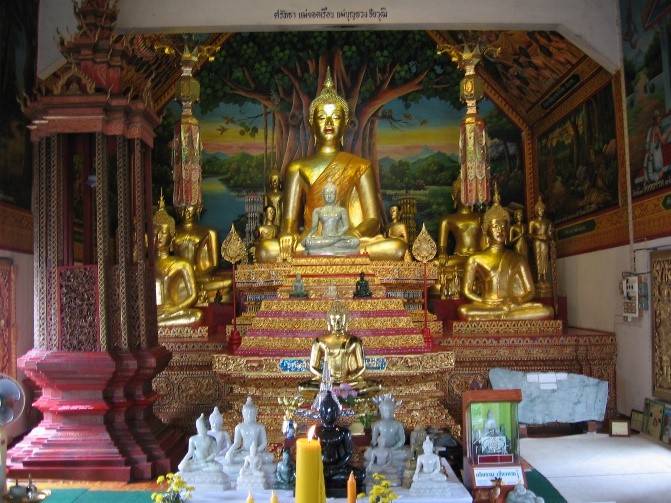
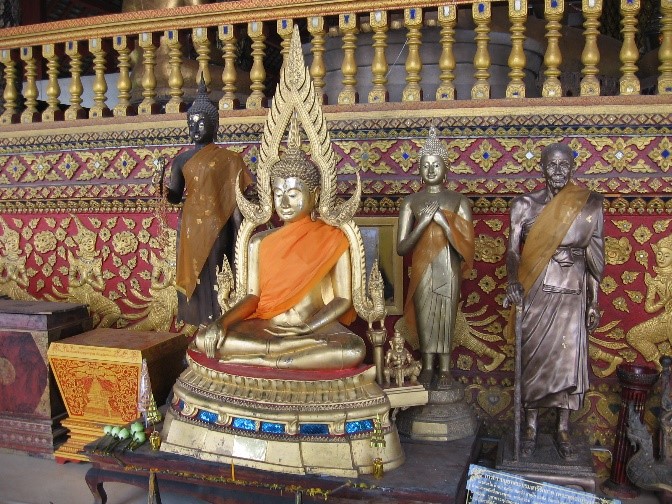
Reincarnation
Through reincarnation, or rebirth, all human beings reap good or evil consequences of their actions. The quality of their deeds of body, speech, thoughts, in previous lives determines the circumstances of rebirth
By a proper understanding of the human situation, imprisonment in the process of karma, and by obedience to right actions, it is possible to transcend the human situation. This involves, not abolishing karma, but liberation from its inner grip and a reorientation of life, ie adherence to good karma and it positive effects.
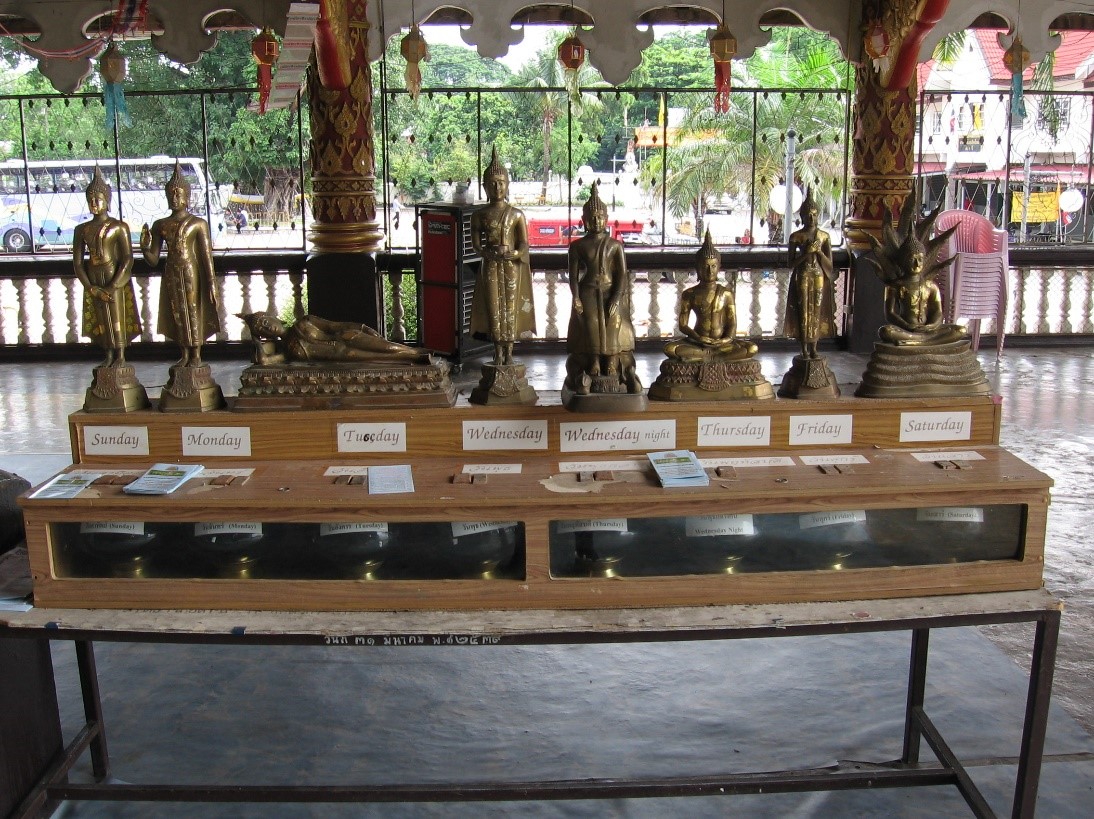
Buddhist Worship
The Buddha's experience has been summed up in Four Noble Truths:
- the universal fact/experience of suffering (mental and emotional, as well as physical) is the effect of past karma; all individual existence is miserable and painful
- 'Birth is suffering; aging is suffering; illness if suffering;' worry. misery, pain. , distress and despair are suffering; not attaining what one desires is suffering" (Buddha); the curse from which Buddhists hope to escape is life itself
- the cause of suffering is craving or grasping for wrong things, or for right things in the wrong way; the basic human problem is misplaced sense of values and desires. Nothing in the material world is worthy of ultimate reverence, or can be depended on in any ultimate sense.
- the end/cessation of suffering is possible; the human dilemma can be solved, suffering must be totally extinguished, there is to be no remainder; this means being freed from the endless cycle of rebirth and entering the state of Nirvana (an area where there is no earth, water fire or air; not the region of infinite space, not the region of nothing at all; nor the border between distinguishing and not distinguishing; not this world, nor the other world; the place from which there will be no rebirths; neither changing nor standing still; the end of suffering - Nirvana can only be described by negatives. Nirvana can be experienced before death by means of meditation.
- the escape from suffering is through following the Noble Eightfold Path
| 1. | right views/knowledge | wisdom and understanding |
| 2. | right attitude/aspirations |
| 3. | right speech | ethical conduct |
| 4. | right actions/conduct |
| 5. | right means of living |
| 6. | right effort | mental discipline |
| 7. | right mindfulness/awareness |
| 8. | right composure/concentration |
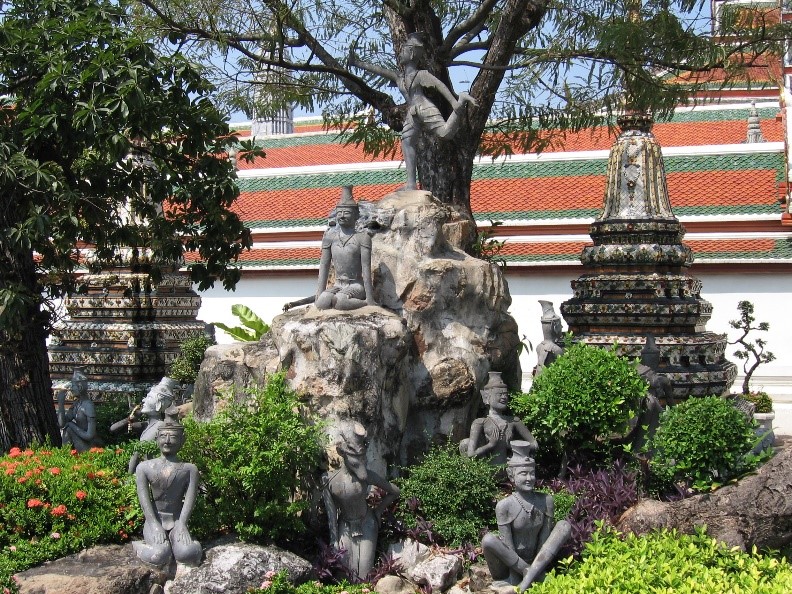
Buddhism teaches that we must all follow Five Precepts:
- no killing (of animals); all life is one and to kill (even inadvertently) is to sin against oneself;
- no stealing, wealth is licit but it must be gained honestly;
- no illicit sexual relations; no adultery;
- no wrong speech, Buddhists are expected to be peacemakers and to tell the truth at all times,
- no drugs or alcohol, as these are not necessary and encourage laziness and physical dependence.
Buddhist monks and nuns follow a path of asceticism, including strict celibacy and repudiation of personal property
Buddhist leaders are often involved in education and charity. Others separate themselves and live in monasteries (eg Tibet). Buddhists are expected to support the community of monks. In some countries (eg Thailand) all boys are expected to commit part of their lives to the monastery, as an element of their education.
Buddhist clergy are often involved in political life, eg
- the Dalai Lama;
- militant Buddhism in Sri Lanka has contributed to the current civil war in that country;
- Burmese monks have been involved in agitation against the military regime in Burma/Myanmar;
- monks influence political life in Thailand
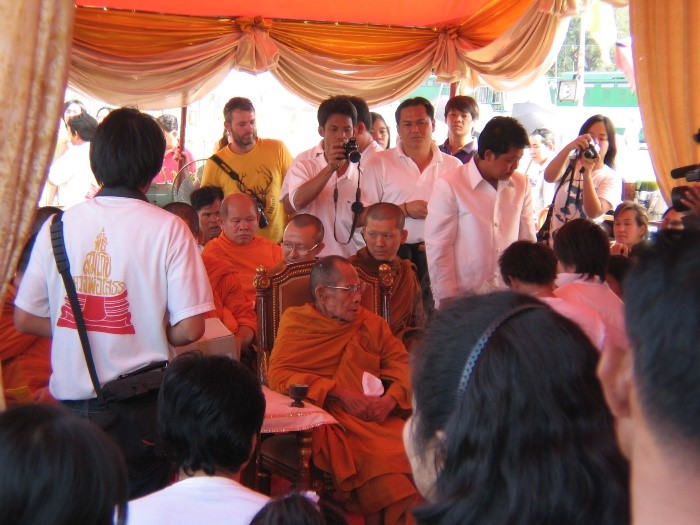
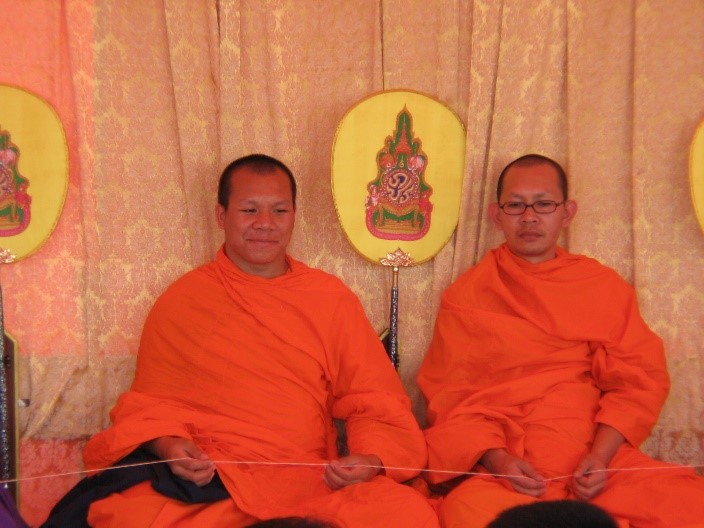
Buddhists claim what appears to be worship of idols is merely paying respect to them. Buddha is revered as an example of a saintly life. Worship includes the following.
- offerings, in the form of flowers, food, water or candles
- bowing before the image of the Buddha, an act of reverence that consists of the worshipper touching the ground three times with his head
- removing one's shoes when entering a place of worship
- devotions, chants and mantras.
The most common object of ritual worship is the Buddha image. Next in importance is the Stupa, originally a funerary mound containing the relics of the Buddha; many Stupas contain the remains of famous monks; others are constructed simply as acts of worship, to gain merit.
Meditation in Buddhism may focus on one's breathing, attitudes, a neutral object or a bodhisattva. The purpose is to divest oneself of craving and sense of self. In some sects it is believed that a bodhisattva can transfer his merit to a supplicant and so help him to Nirvana. In those cases, the Buddhist becomes very much a worshipper petitioning a god.
Buddhist relics include reputed
cutting from the Bo tree; collar bone of Gautyama, imprint of his foot, tooth of Buddha (eg in the Temple of the Tooth in Kandy, Sri Lanka).
Pilgrimages
Pilgrimage. Buddhists go on pilgrimages to sites associated with Gautama Buddha, such as Bodh Gaya in Bihar, India, the place where he became enlightened. They also visit living Buddhist teachers such as the Dalai Lama.
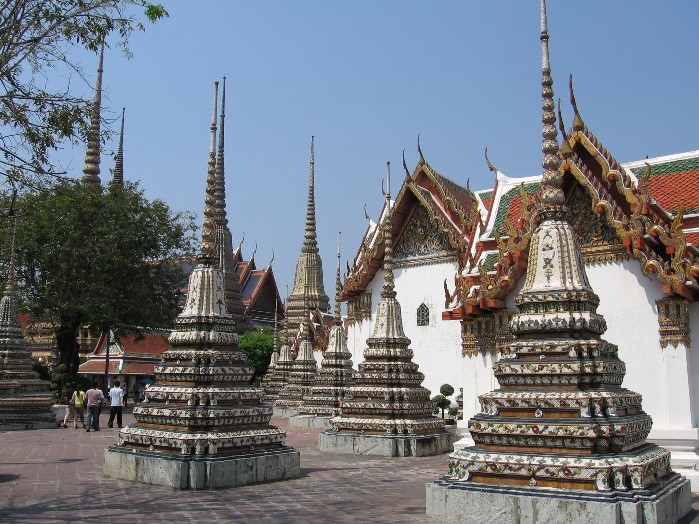
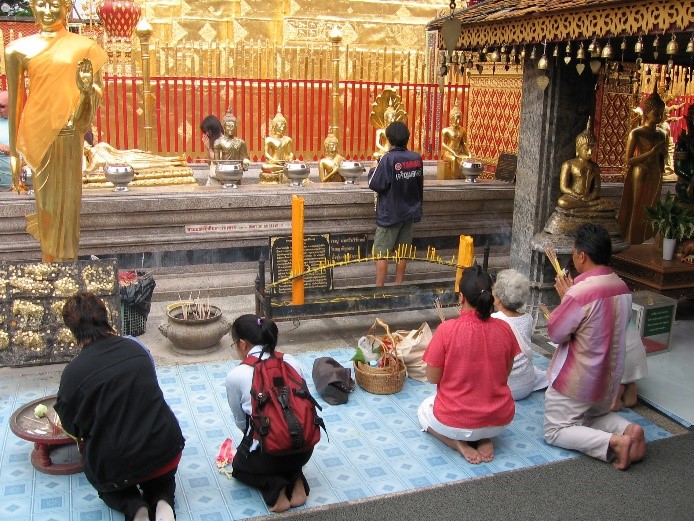
Festivals
Buddhists celebrate festivals linked with the Buddha's life, or with some great event in Buddhist history. Perhaps the most famous Buddhist festival is Wesak, or Vesakha-puja.
In Sri Lanka, Burma, and Thailand this is an important annual festival during April and May. It celebrates the birth, enlightenment, and death of Gautama Buddha, Its name is taken from the name of the Sri Lankan month in which it takes place.
Buddhists also mark rites of passage, such as coming of age. They remember the pattern of the Buddha's life, and so boys and girls re-enact his leaving home to renounce the world. When people die their friends and family remind themselves of the Buddha's teaching about impermanence at the cremation ceremony

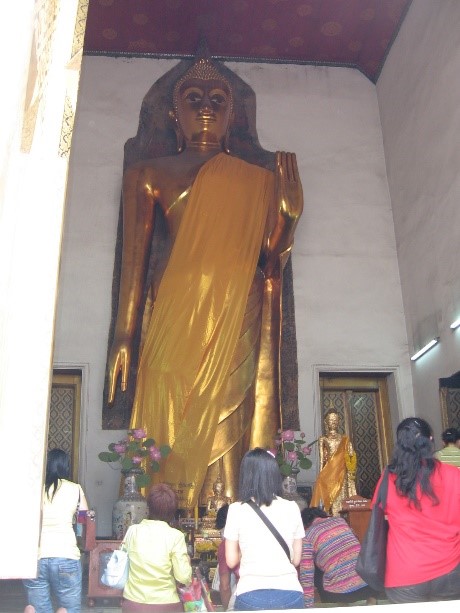
Zen
Zen Buddhism reflects a broad approach to Buddhist belief but is closer to Theravada. It is practised primarily in Japan and has greatly influenced Japanese culture. Since the mid-1960s, however, Zen has gained many followers worldwide.
The goal of Zen is the attainment of a state of spiritual enlightenment called satori. Zen Buddhists believe meditation is the key to achieving satori. There are two major schools of Zen: Rinzai and Soto.
- followers of Rinzai meditate on the meaning of baffling riddles called koans while sitting cross-legged
- people who practise Solo meditate in the same position. They also read from the sacred works of Mahayana Buddhism
Zen rejects an easy way to happiness through reliance on bodhisattvas, focusing instead on self-examination and self-control. Zen Buddhists believe physical labour contributes to the attainment of enlightenment. They work with a teacher called the Master. They believe the whole of truth about life cannot be rightly understood by man, but that certain knowledge can suddenly come about through a shock, such as a blow on the head, a pulled nose, a peel of laughter. Zen followers believe every person possesses the Buddha nature.
Mastery of one's own faculties is achieved through meditation. The Zen practitioner may sit for hours, having given initial attention to the correct positioning of legs, arms, hands, back, head and eyes, and to correct breathing, while the mind is sharpened by concentration to the point of freedom from all bondage to thoughts or imaginations, resulting in a state of "emptiness". When this experience occurs, gods, scriptures, rituals, doctrines, images lose their significance.
ANSWERING THE APPEALS OF BUDDHISM IN THE WEST
| Appeal of Buddhism | The Christian Response |
|---|
| Buddhism is tolerant. Buddhist teaching does not dominate people. Appeals to the worldview of the sceptic. Buddhist teaching about pacifism is needed in the world today. | The breadth and tolerance of Buddhism cannot be denied, however it is doubtful this criterion really gives any religion credibility. It must be a matter of "truth" not personal or cultural preference. Christ gives inner peace, not just an external self-discipline. |
| Buddhism offers the chance to be an atheist without having to dispense with religion. | Buddhism is not atheistic, in practice. Even if it were, the fact that any human system teaches that God does not exist, or is unknowable, does not constitute it the authority. Of more importance is divine revelation. |
| People admire the justice of Buddhism; we reap what we sow. Good people receive rewards; evil people their just deserts. That is better than the Christian view of grace. | Buddhist "justice" is without the mercy of grace. Buddhism is a religion of self-redemption. According to Christian teaching, man is not in a position to save himself. We need to look to God alone for salvation. Christians therefore speak not only about God's justice, but above all of His grace and mercy. |
| Buddhism offers high quality ethics. Who would argue with the splendid character of the Four Noble Truths; the Noble Eightfold Path? Who would disagree with kindness, truth, marital faithfulness, compassion for suffering people? The history of Christianity is stained with blood. | Christians can respect Buddhist morality. But the fact that Christian works of love are imperfect and incomplete should not be blamed on Christianity, but on sin. It is true that Christianity depends on divine forgiveness, but it is precisely here that its value lies. The Christian will be ashamed of the sinfulness of so-called Christians. But at least Christianity is realistic about sin and evil. We can (and should, cf Ephesians 2: 10) live good lives when given new life by Jesus Christ; otherwise we are powerless to do what we ought to do (Romans 7), and totally unable to escape the cycle of sin and death. |
| Among many Buddhist viewpoints, the idea of Nirvana is prominent. The idea that the final goal is to rise above everything and reach a state of lostness, nothingness and bliss beyond suffering - isn't this better (and more contemporary) than the Christian hope of resurrection? | For the Christian who accepts the world as God's creation, life is not identical with suffering. Suffering is one result of humanity's estrangement from God. God, however, does not reject His creation. He wants to give men and women life in all its fullness; this is the meaning of salvation. He does not want us to sink into oblivion, but to find ourselves, in relationship with Him. |
| Buddhism is not materialistic; the root of our unhappiness lies in material possessions and our craving for them. | Jesus also spoke about the "deceitfulness of riches" and spoke about having a heavenly treasure, not depending on material possessions. He did say, however, that God would meet our needs, not that we should renounce them (cf Matthew 6). |

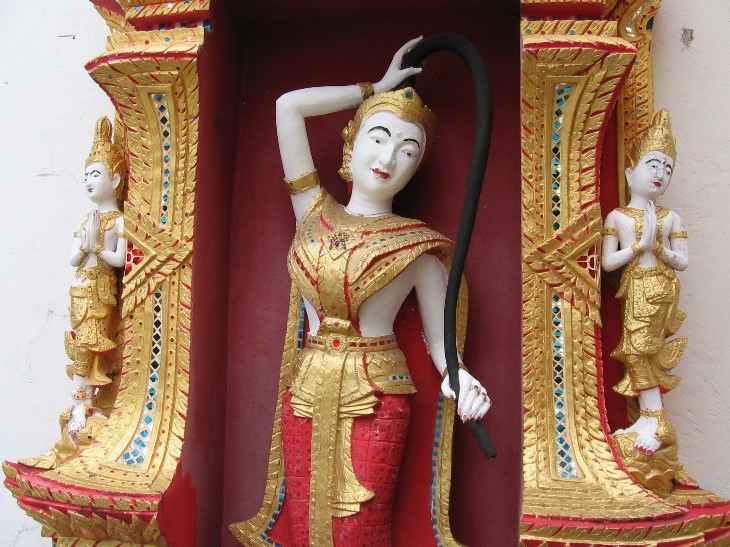
At the end of his life, Buddha said, "I am still searching for truth". Jesus Christ said, "I am the truth" (John 14:6);
Buddhists can be reached by men and women who allow the Word of God to be channelled through them as they speak as human instruments of the Holy Spirit; while Christians could probably learn something from Buddhists about the benefits of meditation, only Christians truly understand (experientially) that the rest and peace that Jesus gives come as a result of forgiveness and redemption, through Christ's blood and reconciliation with God through Him, not as a result of self-effort or resignation to the inexorable laws of karma;
Buddhism declares that, as we look in ourselves we can search for peace and contentment; Jesus offered us peace, in a restless, searching world, because He is the Prince of Peace.
Christians should live the peace of God in their lives if they are to influence Buddhists. Buddhists seek serenity by cutting themselves off from the world, eg through medication; Christ gives us His presence and power in our daily lives, amid the stresses and pressures of modern living; Christians should exercise self-control; however this comes about not as a result of self-discipline but the indwelling, enabling Holy Spirit.
IDOLS, IMAGES
The breadth and tolerance of Buddhism cannot be denied, however it is doubtful this criterion really gives any religion credibility. It must be a matter of "truth" not personal or cultural preference. Christ gives inner peace, not just an external self-discipline. - a representation or symbol of an object of worship, a false god In a few places in the Bible, the word "image" appears in a neutral sense, not referring to a man-made object of worship. Adam, created in the image of God (Gen. 1:26), or Christ, the visible image of the invisible God (2 Cor. 4:4; Col. 1:15), are examples of this.
Most of the time, however, "image" refers to a statue or something of human manufacture that people have substituted for the true and living God. Occasionally it appears in the same sentence with "idol" (Lev. 26: l; 2 Chr. 33:7).
In biblical times idols were made in different ways and of various materials. Judges 17:3 speaks of "a carved image and a moulded image." Some were made of metal or wood, and others were poured into a mould or shaped by hand The silver or gold idols were poured, but the clay ones could also be shaped by hand. The image in Nebuchadnezzar's dream (Dan. 2:32-33) was of gold, silver, bronze, iron, and clay.
In a satire on idolatry, the prophet Isaiah provided considerable detail about the making of idols (Is. 44:9-20). He described the smith with his tongs and hammer and the carpenter with his ruler, line, planes, and compass. Isaiah also ridiculed the idol-makers by noting that such a statue has to be nailed down "that it might not totter" (Is. 41:7).
Perhaps the best definition of an idol is something we ourselves make into a god It does not have to be a statue or a tree. It can be anything that stands between us and God or something we substitute for God
[Nelson 's New Illustrated Bible Dictionary]
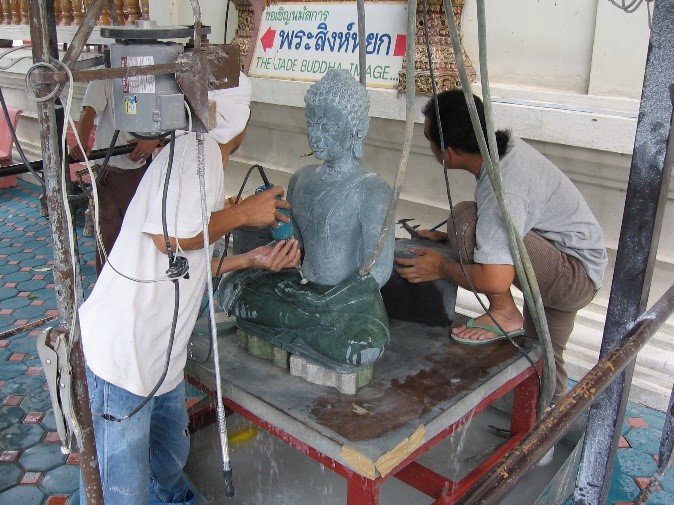
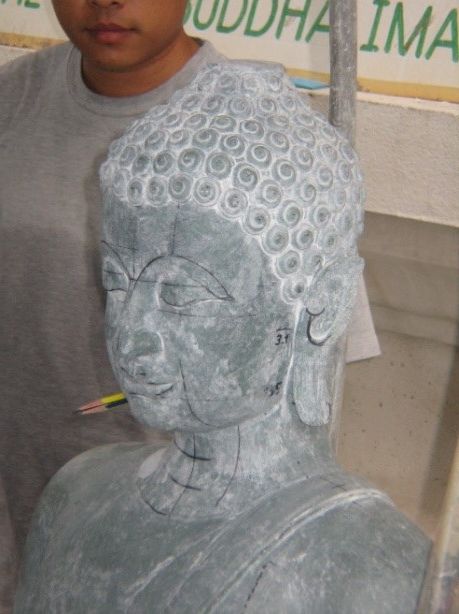
The futility of idolatry.






















